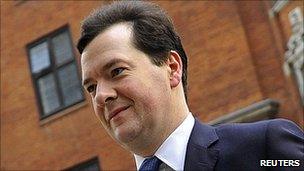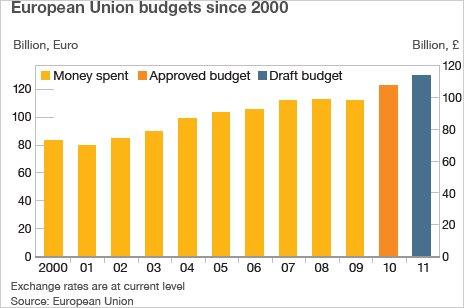Osborne to fight 'unacceptable' EU budget increase
- Published

The chancellor said the EU needed to live within its means like its member states
George Osborne has said the UK is "not prepared to accept" a 4.9% increase in the EU's annual budget, calling for a "reality check in Brussels".
The EU's executive arm, the European Commission, says the rise is needed to fund existing spending commitments.
But the chancellor said it was "completely unacceptable" at a time the UK and others were cutting spending.
The UK cannot veto the proposal on its own but Mr Osborne said "the fight will be joined" over the issue.
The above-inflation 4.9% rise, which has also been criticised by the Dutch and French governments, would take the commission's total 2012 funding to 132.7bn euros (£117bn).
'Get in touch'
Mr Osborne said the Commission needed to rethink the plan and come up with a "much more realistic" proposal.
"The proposal from the Commission for a big budget rise is completely unacceptable," he said. "I think Europe needs to get in touch with reality and Brussels needs to look at what is happening in countries like Britain, and other countries as well in Europe, where we are all having to live within our means.
Mr Osborne said the budget rise was part of a framework agreed by the previous Labour administration and the coalition government was "very clear" it was not satisfactory at a time when the UK and other EU nations were having to take action to reduce their debts.
"We are not prepared to accept the kind of budget proposal that has been put forward today. We need a reality check in Brussels."
With negotiations between the Commission and member states aimed at agreeing a deal set to get under way soon, the chancellor added: "The fight will now be joined over the coming weeks."
Conservative members of the European Parliament have indicated they will oppose the increase while UK Independence Party MEP and leader Nigel Farage said the UK should state in "no uncertain terms" that the rise was unacceptable.
"The Commission have shown they have no respect for the British taxpayer with their latest demands so it's time for Mr Cameron to stop with the talking and take action," he said.
For Labour, shadow foreign secretary Douglas Alexander said the proposed budget increase seemed "ill-judged and unwise" in the current economic climate.
"As these budget negotiations go forward the priority should be to find savings in the EU Budget and refocus spending on the most important areas," he said.
'PR disaster'
According to estimates from the think tank Open Europe, the UK would have to pay £680m more than it currently does to the EU in the event of a 4.9% budget increase.
The organisation, which campaigns for reform of the EU, said there was "little appetite" for such a rise in spending at a time when member states were having to cut back.
"The commission is either completely misreading or wilfully ignoring the public mood around Europe," its director Mats Persson said, describing the proposal as a "PR disaster".
"Just like national governments, the EU has to adapt and find ways to re-shuffle and prioritise the funds available in the current economic climate. Almost everywhere you look there is fat that can be cut from the EU budget - from the 50 or so EU quangos to the wasteful farm subsidies to cohesion subsidies to Europe's richest regions."
EU Budget Commissioner Janusz Lewandowski said administrative spending had been frozen and budgets cut for programmes not meeting their objectives. But he said the EU was legally obliged to continue supporting development projects in poorer parts of Europe.
"We cannot punish our citizens, companies, local and regional authorities who have a right to get their bills paid," he said.
After a lengthy fight the 2011 budget increase was capped at 2.91%. The UK, France and Germany have also proposed that the EU budget be frozen until 2020, with any increases linked to inflation.

- Published20 April 2011
- Published17 December 2010
- Published20 December 2012
- Published4 March 2011